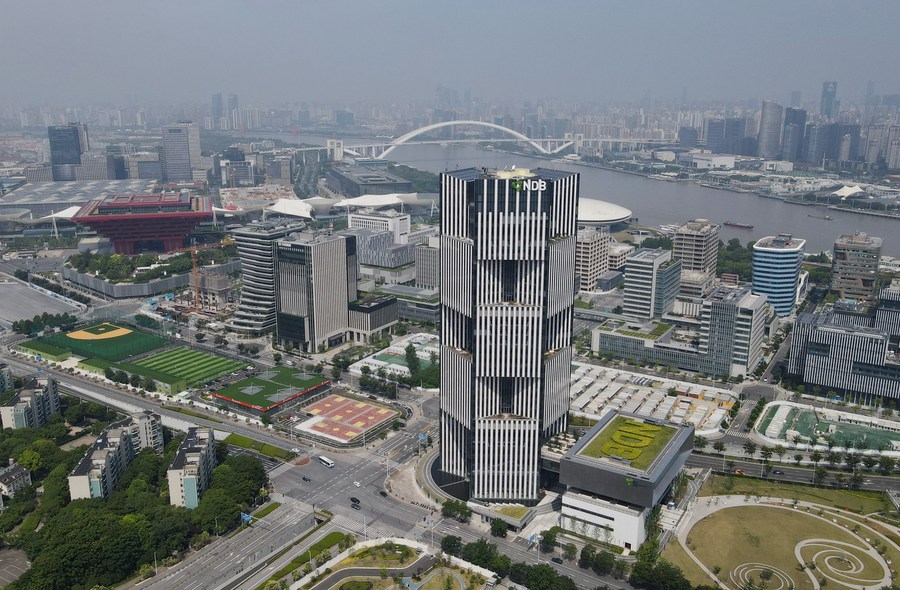With its deliverables of practical cooperation and strong voice for the developing world, BRICS became so attractive that it is growing into a new framework of BRICS+.
by Xin Ping
“More than 40 countries have expressed interest in joining the BRICS group of nations, 22 of which have formally submitted applications,” Anil Sooklal, South Africa’s BRICS Sherpa, has said. To some, it might be big news that so many countries are longing to join this bloc. But to many more, this is just a natural result.
From the day when the original four emerging market countries — Brazil, Russia, India and China — embraced South Africa and turned “BRIC” to “BRICS,” the group has been strengthening its ties with developing countries and emerging economies. With its deliverables of practical cooperation and strong voice for the developing world, BRICS became so attractive that it is growing into a new framework of BRICS+. Its popularity lies in three words as follows.
COOPERATION
During the past two decades, a variety of cooperation mechanisms have been formulated in trade, finance, science and technology, agriculture, culture, education, health, think tanks, etc. Among them, the New Development Bank (NDB) and the BRICS Contingency Reserve Arrangement stand out.
Since its launch in 2015, the NDB has approved nearly 100 loan projects worth more than 30 billion U.S. dollars, providing a strong guarantee for infrastructure construction and sustainable development in emerging market and developing economies and contributing to global growth.
To promote common development for all, the bank also plans to provide 30 billion dollars of financial support from 2022 to 2026, which targets the needs of developing countries. As Dilma Rousseff, president of the NDB and former Brazilian president, puts it, “The NDB listens to the voices of all member countries on an equal footing. It reflects the close ties of the BRICS countries and their shared commitment to South-South cooperation.”
As the NDB provides more financial leverages and supports more projects, the influence of BRICS has gone beyond the five countries. It has become an important cooperation platform for more developing countries, on which they help each other and drive global growth. This can also help improve global .governance and would lead to greater democracy in international relations
At present, the BRICS countries account for nearly 42 percent of the global population, 25 percent of the global economy and 20 percent of the global trade. As of 2022, the five countries combined have enjoyed over 14 percent of the voting power in the World Bank, and over 14 percent of the total share in the International Monetary Fund (IMF).
An expanding BRICS+ framework would mean a bigger say in the international arena. Thanks to the efforts of a vocal BRICS, the long-ignored appeal of the developing world will be valued more.
Unlike the ideology-driven G7 and the Cold War-spawned NATO, BRICS has no interest in geopolitical games or zero-sum thinking. When some major powers are addicted to hegemony and unilateralism, BRICS demonstrates what true multilateralism means — world affairs should not be decided by a single country or a group of countries. They should be discussed by every nation, big or small.
In 2010, urged by the BRICS countries, developed economies agreed to transfer 3.13 percent of the voting rights in the World Bank and 6 percent of the shares in the IMF to developing members. This major change in the world economic landscape marks significant progress in reforming the global economic governance structure. The representation and voice of emerging markets and developing countries have thus been greatly elevated.
“By defending multilateralism, (the) BRICS countries are confronting the concept of the Cold War and offering the possibility of a fairer and more equitable international economic order,” said Cuban President
Miguel Diaz-Canel.
EQUALITY
The BRICS countries are in favor of a new type of international relations featuring mutual respect, fairness, justice and win-win cooperation. Most importantly, they understand that different countries have various national conditions; their core interests and major concerns shall be respected; and the development paths and models they chose on their own must not be interfered with.
Since the United States has abused its global economic dominance for decades and failing to comply with White House orders would incur sanctions or financial blackmail, cooperation with BRICS in investment and trade without preconditions are more desirable to more and more countries.
It is true that differences may exist among the BRICS countries, but that does not prevent the cooperation mechanism from working. The BRICS concepts and principles are in stark contrast to the style of certain countries, who proceed from the position of strength and impose their will on others.
It is precisely because BRICS advocates openness and inclusiveness that it welcomes countries with different civilizations, systems and development paths.
Since the birth of BRICS, it has symbolized expectations for the development of emerging markets and developing economies. It is expected that BRICS will not only successfully expand its membership, but also promote multilateral cooperation to a higher level. The “BRICS+” will lead more countries onto a development path featuring unity, inclusiveness and common prosperity.
Editor’s note: Xin Ping is a commentator on international affairs, writing regularly for Xinhua News Agency, Global Times, China Daily, CGTN, etc. He can be reached at xinping604@gmail.com.
The views expressed in this article are those of the author’s and do not necessarily reflect the positions of Xinhua News Agency.

